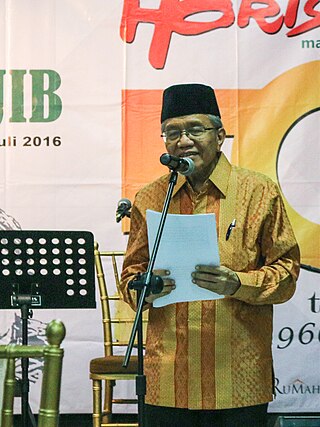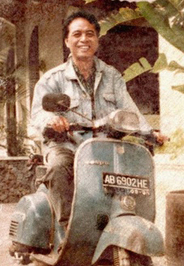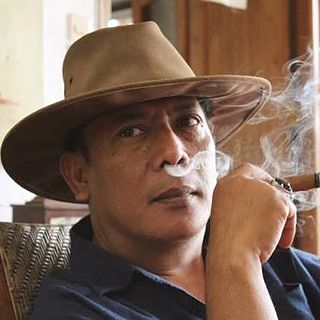Related Research Articles
Sanusi may refer to:
Ahmadun Yosi Herfanda, is an Indonesian journalist and poet. His name is also written as Ahmadun YH, Ahmadun Y. Herfanda, Ahmadun Herfanda, or AYH (ayeha). Ahmadun's poetry focuses on social and religious themes and is informed by Sufism. He is a reporter and arts editor at the daily newspaper Republika. Now, he is known as a famous Indonesian poet and writer.

Indonesian literature is a term grouping various genres of South-East Asian literature.

Taufiq Ismail is an Indonesian poet, activist and the editor of the monthly literary magazine Horison. Ismail figured prominently in Indonesian literature of the post-Sukarno period and is considered one of the pioneers of the "Generation of '66". He completed his education at the University of Indonesia. Before becoming active as a writer, he taught at the Institut Pertanian Bogor. In 1963, he signed the "Cultural Manifesto" as a document that opposed linking art to politics. This cost him his teaching position at the Institut.

Sitor Situmorang was an Indonesian poet, essayist and writer of short stories. Situmorang was born in Harianboho, North Sumatra, and educated in Jakarta. He worked as a journalist and literary critic in Medan, Yogyakarta and Jakarta for a variety of newspapers and periodicals.

Afrizal Malna, is an Indonesian activist, writer of prose, poetry, and theatrical texts.

Linus Suryadi Agustinus, commonly known Linus Suryadi AG or Linus Suryadi AGN was born in Sleman, Indonesia on 3 March 1951 and died in Yogyakarta on 30 July 1999 at the age of 48.

Armijn Pane, also known as Adinata, A. Soul, Empe, A. Mada, A. Banner, and Kartono, was an Indonesian author.

Tengku Amir Hamzah was an Indonesian poet and National Hero of Indonesia. Born into a Malay aristocratic family in the Sultanate of Langkat in North Sumatra, he was educated in both Sumatra and Java. While attending senior high school in Surakarta around 1930, Amir became involved with the nationalist movement and fell in love with a Javanese schoolmate, Ilik Sundari. Even after Amir continued his studies in legal school in Batavia the two remained close, only separating in 1937 when Amir was recalled to Sumatra to marry the sultan's daughter and take on responsibilities of the court. Though unhappy with his marriage, he fulfilled his courtly duties. After Indonesia proclaimed its independence in 1945, he served as the government's representative in Langkat. The following year he was killed in a social revolution led by the PESINDO, and buried in a mass grave.

Poedjangga Baroe was an Indonesian avant-garde literary magazine published from July 1933 to February 1942. It was founded by Armijn Pane, Amir Hamzah, and Sutan Takdir Alisjahbana.

Sanusi Pane was an Indonesian writer, journalist, and historian. He was highly active in literary media, sitting on the editorial boards of several publications. He has also been described as the most important dramatist from before the Indonesian National Revolution.

Roestam Effendi was an Indonesian writer and member of the House of Representatives of the Netherlands. He is known for experimenting with the Malay language in the writing of his drama Bebasari and his poetry collection poetry anthology Pertjikan Permenoengan.

Professor Lafran Pane was an Indonesian academic who is best remembered for establishing the Muslim Students' Association and National Hero of Indonesia.

Sitok Srengenge is an Indonesian poet, actor, and dramatist. Born Sitok Sunarto in Purwodadi, Central Java, he became interested in literature at a young age and was heavily influenced by his village's strong oral tradition. When he moved to Jakarta to complete his university studies, he became involved with the Bengkel Teater under Rendra. Sitok remained with the company for almost a decade, appearing in several plays as he refined his literary style. His first poetry collection, Persetubuhan Liar, was published in 1992.

Lesik Kati Ara, better known as LK Ara, is an Indonesian poet.

Deknong Kemalawati is an Indonesian poet. She is one of the leading poets of modern Indonesia, chairman of the Art Council Banda Aceh, and winner of the Literary Prize of the Government of Aceh.

Diah Hadaning was an Indonesian writer. Among friends she is known as Diha.

Dimas Arika Mihardja was an Indonesian poet and scholar, essayist. He wrote under a pseudonym, the real name is Sudaryono. Among friends he was called as Dam.

Tan Lioe Ie is an Indonesian poet, the first poet in Indonesia who uses Chinese symbolic images in his poetry. Among friends he is called as Yokie.
References
- 1 2 3 (in Indonesian) Shaadily, Hassan. Ensiklopedia Indonesia Jilid 4. Jakarta: Ichtiar Baru dan Van Hoeve.
- 1 2 "Sanusi Pane" (in Indonesian).
- ↑ "Puisi-Puisi Sanusi Pane" (in Indonesian).